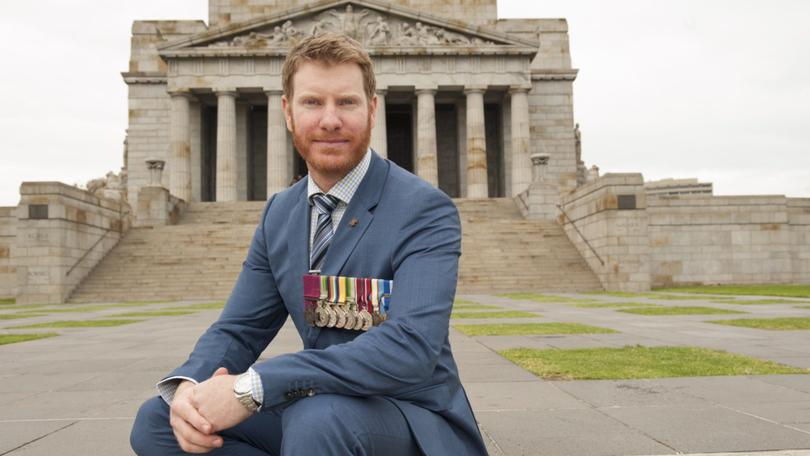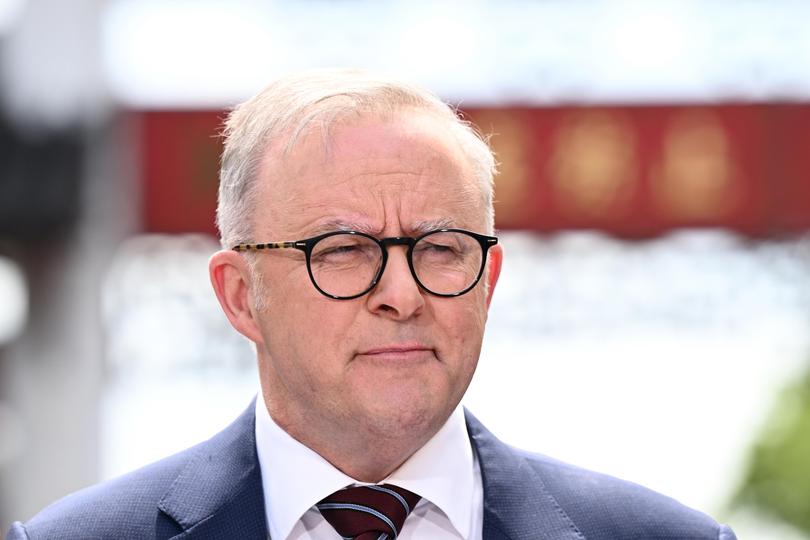JENI O’DOWD: Tackling shrinkflation alone won’t solve deeper economic pain Aussie families are grappling with
JENI O’DOWD: One of Australia’s most decorated war heroes is auctioning his prestigious Victoria Cross to support his family. His choice is a stark reminder of how dire the cost-of-living crisis is.

Former prime minister John Howard once famously said: “Never underestimate the intelligence of the Australian voter.”
It seems Anthony Albanese didn’t get the memo. His announcement last week that the Government would crack down on “shrinkflation” — where product sizes shrink but prices stay the same — hasn’t exactly won over the public.
Instead, most see it as a thinly veiled election tactic, a distraction from the bigger and more pressing cost-of-living crisis — a crisis so bad that one of our most decorated war heroes, Daniel Keighran, is auctioning his prestigious Victoria Cross and other medals to support his family.
Sign up to The Nightly's newsletters.
Get the first look at the digital newspaper, curated daily stories and breaking headlines delivered to your inbox.
By continuing you agree to our Terms and Privacy Policy.His heartbreaking choice to part with symbols of unimaginable bravery is a stark reminder of just how dire the cost-of-living crisis has become.
Addressing shrinkflation is a Band-Aid solution for a much larger issue. Australians are more concerned about the overall affordability of essentials, not just whether they’re getting fewer chips in a packet.
The reality is that small measures like this won’t ease the mounting pressure on households facing skyrocketing rent, utility bills, and grocery costs, all while wages stagnate and inflation bites.
Tackling shrinkflation alone won’t solve the deeper economic pain that families like Daniel Keighran’s are grappling with.
Shrinkflation is not exactly a new issue. Take the infamous example from 2015, when Arnott’s reduced the number of Tim Tams in a packet from 11 to nine while keeping the price the same.
The public outcry was huge, and this was just one of many cases over the years where shrinkflation quietly ate into our wallets. Many social media sites like Reddit have groups devoted to revealing the latest example of shrinkflation, and most Aussies are keenly aware of that.
The Government’s press release read: “The Albanese Government is taking action to fight shrinkflation in our supermarkets and retail sector by strengthening the Unit Pricing Code to make it easier for Australians to make accurate and timely price comparisons.”
But here’s the thing — it’s not the supermarkets who reduce the size of products; it’s the manufacturers.
Shrinkflation is a symptom of more significant economic pressures. Manufacturers are cutting corners to maintain profits because of inflation, supply chain issues, and rising operational costs.
This so-called crackdown from the Albanese Government feels more like a political diversion than a genuine attempt to alleviate the pressure Australians feel at checkout.
We need meaningful action on the cost of living, not minor tweaks to tiny pricing labels.
Let’s face it: a single apple now costs nearly $2, dishwashing tablets can cost $34 even when they’re on sale, and a punnet of strawberries can cost $5.
In this economic climate, every dollar counts. So, sorry kids, it looks like it’s Coles brand chips for afternoon snacks again.
Voters know this move will not bring actual prices down — it’s just window dressing ahead of an election.
And their reaction to what the Government thought was a feel good announcement tells it all.
“There must be an election coming soon … Albo is attempting to distract the masses by deflecting his Government’s incompetence,” reader Dirk D wrote on The Nightly.
And Bernie M said: “This is a complete beat-up and an attempt by a failing Labor government to be doing something constructive for Australian consumers when, in fact, their actions are all smoke and mirrors.”

Leading political commentators were quick to weigh in on the Government’s announcement.
Peter van Onselen, Daily Mail Australia’s political editor, was sceptical about the effectiveness of the Government’s intervention, noting a tweet by the Prime Minister came as NSW and Victoria governments grappled with looming Middle East protests.
“It begs the question — was this announcement more of a distraction or a genuine attempt to ease financial pressures?” he wrote.
On The Nightly, Paul Murray took a more granular approach, scrutinising the products the ACCC identified as shrinkflation examples.
“So even if the rorting is confirmed, what real effect would it have had on the average shoppers’ cost of living?” he asked.
The Government would do well to pay attention to public sentiment. Whenever he visited Australia, media powerhouse Rupert Murdoch always asked newspaper editors what the main issue in the letters to the editor was.
He knew the letters often reflected the concerns and frustrations of everyday Australians. If the Government hopes to gain voters’ trust, it should listen to what people genuinely worry about — rising costs, stagnant wages, and economic pressures.
And, rather than adding information to a tiny pricing code, why not make it mandatory for supermarkets to clearly flag when a product has shrunk in size but remained at the same price, as France has done? French consumers will soon be alerted when product sizes drop, making it much easier for shoppers to understand what they’re paying for.
This would be far simpler for consumers than examining unit prices, which are easy to overlook — especially for people who buy the same product week after week, assuming they know its value without checking the fine print.
Obviously, unit pricing matters. But what Australians need right now is meaningful action to reduce the everyday cost of living. What’s the plan for that, Mr Albanese?
Grocery prices are soaring, and wages have not kept pace. Rent prices are through the roof, and utility bills are so crippling that many families sit around in blankets with the heater turned off during winter. And let’s not even start on the cost of buying a home, especially in Sydney or Melbourne.
As we continue to tighten our belts, it’s clear that small, symbolic measures like tackling shrinkflation won’t address the deeper financial strain gripping the country.
Daniel Keighran’s decision to auction a medal that represents the highest form of service and sacrifice to his country should be a wake-up call to the Albanese Government.
When even our national heroes are forced to part with their most treasured possessions just to make ends meet, it’s time to stop with the distractions and start taking meaningful action to address the real cost-of-living crisis.
Will the government rise to the occasion, or will families like Daniel’s continue to bear the brunt of inaction?
Sadly, I think we all know the answer to that.
